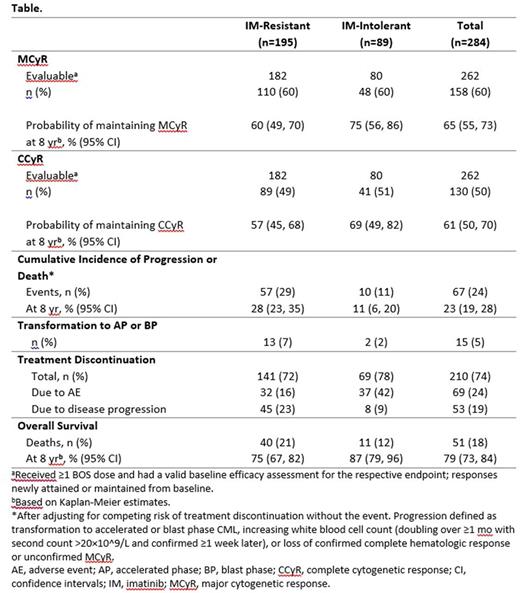Abstract
Bosutinib is an orally active, dual SRC/ABL tyrosine kinase inhibitor (TKI) approved for treating adult patients with chronic phase, accelerated phase (AP), or blast phase (BP) Philadelphia chromosome-positive (Ph+) CML with resistance or intolerance to prior therapy. In an open-label, phase 1/2 study (NCT00261846), second-line bosutinib demonstrated durable hematologic and cytogenetic responses and good tolerability in patients with Ph+ CP CML who were imatinib resistant (IM-R) or imatinib intolerant (IM-I) (Cortes, Am J Hematol, 2016). Here we report a 96-month update of this study and its ongoing extension study (NCT01903733).
Adult patients with Ph+ CP CML who were resistant or intolerant to first-line imatinib were included in this analysis. 195 IM-R and 89 IM-I patients received bosutinib starting at 500 mg/d. Median age (range) was 53 yr (18-91 yr), time from CML diagnosis was 3.7 yr (0.1-15.1 yr), treatment duration was 25.6 mo (0.2-133 mo), and follow-up duration was 53.7 mo (0.5-133 mo). Bosutinib dose was increased to 600 mg/d in 13% of patients. For the last enrolled IM-R and IM-I patients, time from first dose of bosutinib to data cutoff was 96.5 mo and 94.2 mo, respectively. At 8 yr, 26% of patients were still receiving bosutinib.
Major cytogenetic response (MCyR) was achieved by 60% of patients in both groups (Table). Median duration of MCyR was not reached as of the minimum follow-up, and the Kaplan-Meier probability of maintaining MCyR at 8 yr was 60% (IM-R) and 75% (IM-I). Complete cytogenetic response (CCyR) was achieved by 49% (IM-R) and 51% (IM-I) of patients. Median duration CCyR was not reached as of the minimum follow-up, and the Kaplan-Meier probability of maintaining CCyR at 8 yr was 57% (IM-R) and 69% (IM-I) of patients. On-treatment transformation to accelerated phase or blast phase occurred in 7% (IM-R) and 2% (IM-I) of patients with no new events since the 5-yr follow-up. The cumulative incidence of on-treatment progression or death at 8 yr was 28% (IM-R) and 11% (IM-I), respectively (Table). Overall survival at 8 yr on study was 75% for the IM-R group and 87% for the IM-I group.
Dose delays due to adverse events (AEs) occurred in 133 (68%) and 76 (85%) of IM-R and IM-I patients, resulting in median cumulative treatment delays of 25 d and 27 d, respectively. Dose reductions due to AEs occurred in 93 (48%) and 54 (61%) of IM-R and IM-I patients, respectively. Median cumulative duration of dose reduction was 357 d and 267 d, and median time to dose reduction was 49 d and 54 d in the IM-R and IM-I cohorts, respectively. By 8 yr, treatment was discontinued in 141 (72%) and 69 (78%) of IM-R and IM-I patients, respectively. The most common reasons for discontinuation were disease progression (23%) and AEs (16%) in the IM-R cohort, and AEs (42%) and patient request (13%) in the IM-I cohort. In the IM-R cohort, the most frequent AEs leading to permanent treatment discontinuation were thrombocytopenia (4%), increased ALT (2%), and diarrhea (2%). In the IM-I cohort the most frequent AEs leading to permanent treatment discontinuation were thrombocytopenia (11%), neutropenia (5%), increased ALT (3%), and rash (3%). Among the 40 patients (21%) in the IM-R cohort who died on study, the most frequent reasons for death were disease progression (12%) and AEs unrelated to study drug (7%). For the 11 patients (12%) in the IM-I cohort who died on study, the most frequent reasons were disease progression (7%) and unknown (3%). No patients died due to an AE related to study drug and 13 patients (5%) died within 30 days of last dose. Five subjects died since the 5-yr follow-up; 3 within 30 days of last dose.
These long-term (8-yr) data are consistent with previous findings associating second-line bosutinib therapy with similar rates of durable major cytogenetic responses in the majority of patients with imatinib-resistant and imatinib-intolerant CP CML. Most AEs could be managed through temporary treatment interruptions and dose reductions.
Brümmendorf: Novartis: Consultancy, Research Funding; Takeda: Consultancy, Research Funding; Pfizer: Consultancy, Research Funding. Gambacorti-Passerini: BMS: Consultancy; Pfizer: Consultancy, Honoraria, Research Funding. Pagnano: Roche: Speakers Bureau; Amgen: Consultancy; Bristol-Meirs Squibb: Consultancy, Speakers Bureau; Novartis: Consultancy. Aguiar: Pfizer: Employment, Equity Ownership. Leip: Pfizer: Employment, Equity Ownership. Cortes: Teva: Research Funding; Pfizer: Consultancy, Research Funding; Novartis Pharmaceuticals Corporation: Consultancy, Research Funding; ImmunoGen: Consultancy, Research Funding; BMS: Consultancy, Research Funding; Sun Pharma: Research Funding; ARIAD: Consultancy, Research Funding.
Author notes
Asterisk with author names denotes non-ASH members.


This feature is available to Subscribers Only
Sign In or Create an Account Close Modal